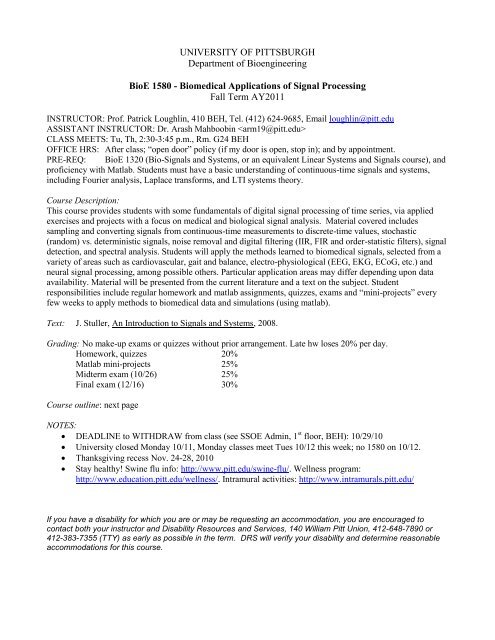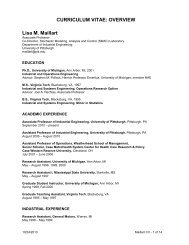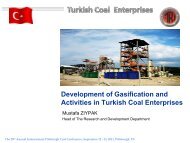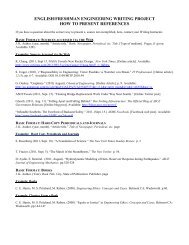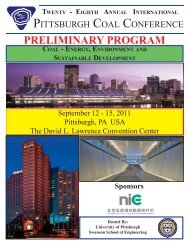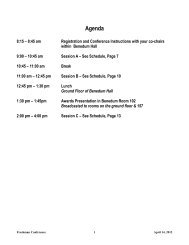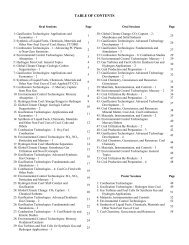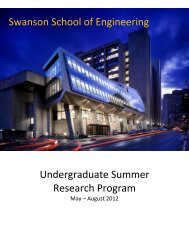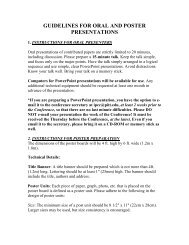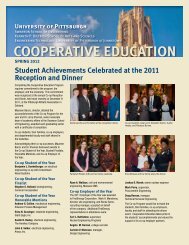BIOENG 1580 Syllabus - University of Pittsburgh
BIOENG 1580 Syllabus - University of Pittsburgh
BIOENG 1580 Syllabus - University of Pittsburgh
- No tags were found...
You also want an ePaper? Increase the reach of your titles
YUMPU automatically turns print PDFs into web optimized ePapers that Google loves.
UNIVERSITY OF PITTSBURGH<br />
Department <strong>of</strong> Bioengineering<br />
BioE <strong>1580</strong> - Biomedical Applications <strong>of</strong> Signal Processing<br />
Fall Term AY2011<br />
INSTRUCTOR: Pr<strong>of</strong>. Patrick Loughlin, 410 BEH, Tel. (412) 624-9685, Email loughlin@pitt.edu<br />
ASSISTANT INSTRUCTOR: Dr. Arash Mahboobin <br />
CLASS MEETS: Tu, Th, 2:30-3:45 p.m., Rm. G24 BEH<br />
OFFICE HRS: After class; “open door” policy (if my door is open, stop in); and by appointment.<br />
PRE-REQ: BioE 1320 (Bio-Signals and Systems, or an equivalent Linear Systems and Signals course), and<br />
pr<strong>of</strong>iciency with Matlab. Students must have a basic understanding <strong>of</strong> continuous-time signals and systems,<br />
including Fourier analysis, Laplace transforms, and LTI systems theory.<br />
Course Description:<br />
This course provides students with some fundamentals <strong>of</strong> digital signal processing <strong>of</strong> time series, via applied<br />
exercises and projects with a focus on medical and biological signal analysis. Material covered includes<br />
sampling and converting signals from continuous-time measurements to discrete-time values, stochastic<br />
(random) vs. deterministic signals, noise removal and digital filtering (IIR, FIR and order-statistic filters), signal<br />
detection, and spectral analysis. Students will apply the methods learned to biomedical signals, selected from a<br />
variety <strong>of</strong> areas such as cardiovascular, gait and balance, electro-physiological (EEG, EKG, ECoG, etc.) and<br />
neural signal processing, among possible others. Particular application areas may differ depending upon data<br />
availability. Material will be presented from the current literature and a text on the subject. Student<br />
responsibilities include regular homework and matlab assignments, quizzes, exams and “mini-projects” every<br />
few weeks to apply methods to biomedical data and simulations (using matlab).<br />
Text: J. Stuller, An Introduction to Signals and Systems, 2008.<br />
Grading: No make-up exams or quizzes without prior arrangement. Late hw loses 20% per day.<br />
Homework, quizzes 20%<br />
Matlab mini-projects 25%<br />
Midterm exam (10/26) 25%<br />
Final exam (12/16) 30%<br />
Course outline: next page<br />
NOTES:<br />
DEADLINE to WITHDRAW from class (see SSOE Admin, 1 st floor, BEH): 10/29/10<br />
<strong>University</strong> closed Monday 10/11, Monday classes meet Tues 10/12 this week; no <strong>1580</strong> on 10/12.<br />
Thanksgiving recess Nov. 24-28, 2010<br />
Stay healthy! Swine flu info: http://www.pitt.edu/swine-flu/. Wellness program:<br />
http://www.education.pitt.edu/wellness/. Intramural activities: http://www.intramurals.pitt.edu/<br />
If you have a disability for which you are or may be requesting an accommodation, you are encouraged to<br />
contact both your instructor and Disability Resources and Services, 140 William Pitt Union, 412-648-7890 or<br />
412-383-7355 (TTY) as early as possible in the term. DRS will verify your disability and determine reasonable<br />
accommodations for this course.
Course outline: (tentative/approximate, except for exam dates and due dates)<br />
Week Topics<br />
1. (8/31,9/2) Intro & overview <strong>of</strong> course. Review <strong>of</strong> continuous-time linear time-invariant (LTI) systems<br />
theory: impulse and step response, convolution, input-output differential equation description, Fourier,<br />
Laplace, frequency response, transfer function, close-loop (feedback) control systems.<br />
2. (9/7,9) LTI rvw, cont’d. From continuous- to discrete-time: sampling and Nyquist criterion; aliasing and<br />
anti-alias filters: the Butterworth LPF, design specifications for desired attenuation at Nyquist.<br />
3. (9/15,16) From continuous to discrete: Difference equations; linear shift-invariant (LSI) discrete time<br />
systems; the z-transform. LSI system transfer functions<br />
4. (9/21,23) Z transform, cont’d. finite-impulse response (FIR) and infinite-impulse response (IIR)<br />
systems. Inverse systems; All-pole (AR) & all-zero (MA) systems.<br />
5. (9/28,30) Z-transform, cont’d. Converting from s-domain to z-domain and vice versa. Forward and<br />
backward rectangular rule; bilinear transform; impulse invariance. Control systems. Matlab project 1<br />
assigned 9/30: Human balance and postural control.<br />
6. (10/5,7) Discrete Fourier analysis: Frequency response, DTFT, DFT, relations to FT.<br />
7. (10/12,14) [No class 10/12 – Monday classes instead.] Discrete Fourier analysis, cont’d. Matlab project<br />
1 due 10/14.<br />
8. (10/19,21) Enhancing / detecting signals in noise: ensemble averaging; filtering; correlation; the<br />
matched filter.<br />
9. (10/26,28) MIDTERM Tues. 10/26. Signal enhancement / detection, cont’d; Matlab project 2 assigned<br />
10/28.<br />
10. (11/2,4) Intro to random signals. Wide-sense stationary signals. Autocorrelation, power spectral density.<br />
Spectral estimation (non-parameteric): periodogram, Welch’s method, windowing.<br />
11. (11/9,11) Spectral estimation, cont’d: parametric AR spectral estimation. Matlab project 2 due 11/11.<br />
12. (11/16,18) Guest lectures by Pr<strong>of</strong>. Aaron Batista, on neural signal processing: spike sorting, pattern<br />
recognition.<br />
13. (11/23) Nonlinear filtering: median and order-statistic filters, applied to eye movement data. Matlab<br />
project 3 assigned 11/23: filtering eye movement (and/or skin blood flow) data.<br />
14. (11/30, 12/2) Order-statistic filters, cont’d. Time-varying spectral analysis: the short-time Fourier<br />
transform (STFT) and spectrogram<br />
15. (12/7,9) Matlab project 3 due 12/7. STFT, spectrogram cont’d. Course wrap-up: Q&A, review.<br />
16. (12/16) FINAL EXAM, Thursday 12/16, 12:00-1:50pm, in classroom (G24)


